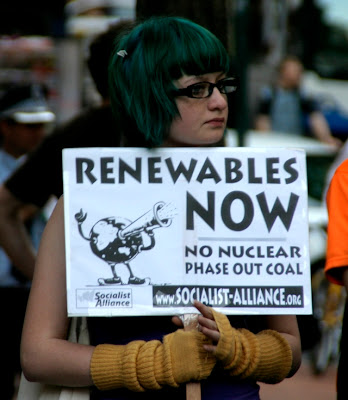environment

US$700 billion dollars is twice the combined debt of the world’s poorest 49 countries.
By Tony Iltis
October 11, 2008 -- “Meltdown” is a word that one hears a lot on the news these days.
Despite the US$700 billion government bailout of banks in the US, similar (albeit smaller) bailouts in Europe, and various forms of state intervention in the finance industry on both sides of the Atlantic, sharemarkets worldwide are in free fall. Comparisons with the Great Depression of the 1930s are common. Homelessness and unemployment are rising and are set to increase dramatically.
Meanwhile, more quietly but even more relentlessly, another meltdown is occurring: that of the polar icecaps. According to the Western world’s establishment politicians and corporate media, the way to avert catastrophic climate change lies in setting up elaborate emissions trading schemes and carbon markets: that is, relying on precisely the mechanisms that have created the economic meltdown!
Global warming - No more business as usual: This is an emergency!

By David Spratt
October 10, 2008 -- A year ago I was researching what was intended to be a short submission to the Garnaut review [commissioned to advise the Australian federal government of Labor Party Prime Minister Kevin Rudd], when events in the polar north turned the world of climate policy upside down. It was found that eight million square kilometres of sea-ice — an area the size of Australia — was melting, in the immortal words of one glaciologist, "a hundred years ahead of schedule".
Yet the international policy debate carried on as if this had not happened. Out-of-date scenarios, research and observations were being used to propose emission reduction targets that would still lead to catastrophe even if fully implemented.
And so a short submission became a long detour into how the climate debate is being constructed, and the result, with Philip Sutton, was a book we did not intend to write, Climate Code Red.
Climate change -- the case for public ownership

Australia’s Socialist Alliance urges a 10-point plan to cut atmospheric CO2

Sydney climate emergency rally, October 3, 2008. Photo by Alex Bainbridge.
Climate action now!
September 25, 2008 -- The Australian federal government’s climate change adviser, Professor Ross Garnaut, has released his recommendations for medium-term cuts to Australian greenhouse gas (GHG) emissions.
He calls for reductions by 2020 of just 5% if there is no comprehensive international agreement on emissions reductions, or reductions of 10% if there is an agreement. At the Bali climate summit in December 2007 many developed countries expressed support for goals of 25-40% reductions.
Cuba: Climate change, disaster and collectivism
By Susana Hurlich
September 17, 2008 -- Havana -- The TV coverage here in Cuba on the impact of hurricanes Gustav and Ike is very instructive, not just in showing clearly the extent of damage, but in giving a sense of the feelings and spirit of the people through many, many different testimonies. I notice that in much of the reporting outside the country, there's not much commentary on this aspect, which is as important -- if not more so in the long run -- as the statistics on damage.

Cuban workers work with heavy machines to remove debris infront of a house in Havana, Cuba on September 9, 2008, after the passing of Hurricane Ike. EPA/ALEJANDRO ERNESTO.
South African and Zimbabwe politicos join global financiers in self-destruction
By Patrick Bond
September 21, 2008 -- The past week has been a wild roller-coaster ride in and out of Southern African ruling-party politics, down the troughs of world capitalism, and up the peaks of radical social activism. Glancing around the region and the world from those peaks, we can see quite a way further than usual.
Looking first to South Africa, September 20's dumping of state president Thabo Mbeki by Jacob Zuma -- president of the African National Congress (ANC) -- and his temporary replacement (until next April 2009's election) by ANC deputy president Kgalema Motlanthe, was an excellent reflection of ruling elite fragility in neoliberal regimes. Some of Mbeki's main supporters, including Mbhazima Shilowa, the former trade union leader and now premier of Gauteng province, in the economic heartland of Johannesburg -- are apparently considering the launch of a competing party.
Celia Hart's last essay: A revolutionary fight against the demon
On September 9, 2008, supporters of the Cuban Revolution were saddened to learn of the sudden deaths of Celia Hart Santamaría and Abel Hart Santamaría, the daughter and son of Armando Hart Dávalos and Haydée Santamaría,

By David Travis
September 9, 2008 -- On the fringe of the green movement, one always hears the following phrases coming from the mainstream with great regularity: "green capitalism", "sustainable capitalism", "social entrepreneurs", "green entrepreneurs", etc. None of these terms tend to mean anything specific, and no one who uses them is in a great hurry to spell out, for example, how a green entrepreneur is different in any fundamental way from some other kind of entrepreneur, or how capitalism could be driven toward sustainability rather than profit. So you can imagine my pleasure at meeting the author of a book called Sustainable Capitalism: A Matter of Common Sense.
India's Katrina: Bihar floods -- criminal negligence, not divine deluge (+ emergency appeal)
By Communist Party of India (Marxist-Leninist) Liberation
[See below for relief fund details.]
September 2, 2008 -- The regime of Nitish Kumar, which rules the Indian state of Bihar, boasts of ``Bihar Shining''. These claims are now submerged by the cries of ``Bihar Drowning''. The National Democratic Alliance (NDA) government's claims of ``good governance'' have proved a washout in the face of the floods, and now the Chief Minister Kumar is trying to paint the floods as a ``natural'' calamity or divine ``deluge'' (Pralay).
Nothing could be further from the truth. The flood devastation was highly preventable – and is a direct result of callous negligence of basic flood-prevention strategies by the Bihar and central Indian governments. Despite the fact that every year breaches in embankments cause floods in the state, maintenance and repair of embankments have been rampantly neglected.
Debunking the `Tragedy of the Commons'
By Ian Angus
August 24, 2008 -- Will shared resources always be misused and overused? Is community ownership of land, forests and fisheries a guaranteed road to ecological disaster? Is privatisation the only way to protect the environment and end Third World poverty? Most economists and development planners will answer “yes” — and for proof they will point to the most influential article ever written on those important questions.
Since its publication in Science in December 1968, “The Tragedy of the Commons” has been anthologised in at least 111 books, making it one of the most-reprinted articles ever to appear in any scientific journal. It is also one of the most quoted: a recent Google search found “about 302,000” results for the phrase “tragedy of the commons”.
For 40 years it has been, in the words of a World Bank discussion paper, “the dominant paradigm within which social scientists assess natural resource issues” (Bromley and Cernea 1989: 6). It has been used time and again to justify stealing indigenous peoples’ lands, privatising health care and other social services, giving corporations ``tradable permits'' to pollute the air and water, and much more.